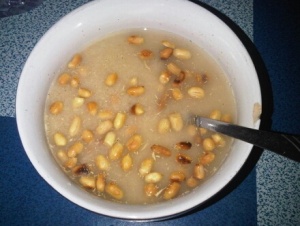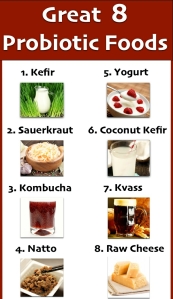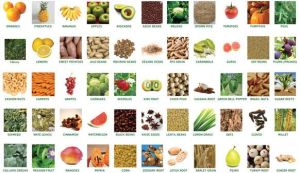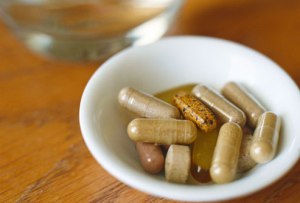Ijebu Ewe so o (greetings in Ijebu)
Today I am excited to share the wonderful health benefits of Ijebu-Garri and my excitement is due in part because I belong to the Ijebu tribe in Nigeria best known for our resourcefulness, sophistication and beauty (honestly I am not making this up..lol). Both my parents are from Ijebu so I am a full blooded member of the clan. 🙂 Also my grandmother (God rest her soul) made and sold Ijebu Garri for many years at the market in Ijebu-Ife. As a matter of fact, it wasn’t until she passed on did we start buying garri, we always had a constant supply of high quality Ijebu garri courtesy her. It therefore gives me great joy to tell of the many benefits of Ijebu Garri in loving memory of ‘Mama Ijebu’ (that’s what we called her).
First a little bit of background.
What is Garri?
Garri is a fine to coarse granular flour of varying texture made from cassava tubers (also called cassava roots) which are cleaned after harvesting, grated, water and starch squeezed out of it, left to ferment and then dry-fried (dehydrated) either with palm oil or without palm oil. This is a major staple food in West Africa and eaten in a variety of ways.
One such way is to drink it, this is by far Nigeria’s number one fast food simply add water to the grains stir and there you have it. People often add sugar, groundnut or milk to it – making it a balanced meal/snack. 🙂

The other way is to cook it in hot water and made into a dough (Eba) which is eaten with a wide variety of sauces.
What makes Ijebu-Garri so special and beneficial to Health?
My research interest with Garri began when I started looking into the health benefits of probiotics (will explain this latter). Upon reading how many traditional diets provide probiotic benefits through fermented foods such as sauerkraut, tempeh etc; I began to think about what fermented foods we had in Nigeria. Quite naturally Garri came out top on the list, this along with Ogi/Pap/Akamu (made from fermented corn or millet grains), Iru (a natural food seasoning made from fermented locust beans) and wara (local cheese).
So what makes Ijebu-Garri so special? Ijebu-Garri is left to ferment for much longer which gives it its characteristic sour taste. The effect of prolonged fermentation is twofold; one is that the carbohydrate (starch) content is reduced to a greater extent and the probiotic benefits are optimised as bacterial population increases the longer the fermentation process.
Ijebu-Garri is also dehydrated to a greater extent which further reduces the risk of moulds giving it a longer shelf life.
What is Fermentation?
Fermentation is a process whereby the sugars and starches are eaten up by bacteria cultures and converted to produce lactic acid, carbon-dioxide and more bacteria (friendly one’s); and the longer the fermentation process the more sugar and starch is eaten up and the lower the dietary carbohydrate present in the food. This is the reason why fermented foods are often advocated amongst diabetics or those looking to control blood sugar levels and lose weight.
What are Probiotics?
Probiotic which means ‘for life’, is a general term for microorganisms that contribute to health in the intestinal tract. They are beneficial bacteria that help us fight disease and illness.
There are billions of friendly bacteria in the body, all performing wonderful functions such as aiding digestion, improve immune function, balance hormonal levels, protect against infections from fungi and yeast (which can go into the bloodstream and cause diverse illnesses), help keep the body generally alkaline which according to some is the most beneficial state for good health, manufacture of some B vitamins, and lots more.
The use of antibiotics (which do not distinguish between good and bad bacteria, and as such kill off both good and bad bacteria), poor diet and stress can lower the number of these friendly bacteria. This can lead to a state known as Dysbiosis which is a bacterial imbalance where there is an unwanted increase of bad bacteria and yeast. Dysbiosis has been reported by some to be at the root of a number of conditions such as yeast infections, irritable bowel syndrome and rheumatoid arthritis 1. Many health experts believe that having adequate amount of friendly bacteria which help to crowd out bad bacteria that invade our intestines is the best way to ensure good health.
How do we increase or maintain adequate levels of friendly bacteria?
- Eat Cultured/Fermented foods – A study carried out by Osho et al (2009) and published in the African Journal of Food found Lactobacillus (a probiotic) in Garri samples taken from markets in Ogun state. They concluded by saying that small-scale fermented foods such as Garri and Iru are a good source of Probiotic bacteria. Other fermented foods include live yoghurt, cheese, kefir (a fermented milk drink), natural miso (made from fermented soybeans ,barley or rice) natural sauerkraut (made from fermented cabbage), tempeh, and kimchi (made from fermented cabbage)
- Eat a Fibre rich Diet – Fibre from fruits, legumes and wholegrain are a good source of Prebiotics (not to be confused with Probiotics). Prebiotics are derived from carbohydrate fibres called oligosaccharides. These are not broken down in the digestion process and as such remain in the digestive tract where they help feed and encourage the growth of good bacteria. The fibre in Garri may also provides Prebiotic benefits making Garri a food that provides both pro and prebiotic benefits, how awesome is that! 🙂
- Take Probiotic and Prebiotic Supplements – These are available in capsule or liquid form. Do consult your health provider before taking supplements.
Another benefit of Ijebu Garri which I touched on briefly at the beginning of this post is that it has a lower starch content/dietary carbohydrate. First, the initial process of soaking and draining reduces starch conent, which is then further reduced by the fermentation process.
It is difficult to know the exact carbohydrate count of a fermented food but the principle to always bear in mind is this: the longer the fermentation time, the more carbohydrate is eaten up by the micro-organisms and the more sour it is the lower the dietary carbohydrate.
This information is further evidenced by the fact that we Ijebu’s always prepare Eba on the fire (my room-mate at UNI was shocked when she saw me doing this once and I was shocked that she was shocked..lol) simply putting hot water in a bowl and mixing in the Garri will not give it that ‘elastic’ consistency. Even with that, the ‘elastic’ consistency (which implies a higher starch content) we get is still lower when compared with other types of Garri such as ‘Yellow Garri’.
This is the reason why many non-Ijebu’s say Ijebu Garri is best only for drinking. This in itself is a blessing because some have said that the probiotic benefits of a fermented food can be reduced by heat and as such drinking Garri might be the best way to get its probiotic benefits.
Either way whether you decide to soak it or eat it as Eba, Ijebu Garri remains the King of Garris! 🙂
What fermented foods do you have in your part of the world?





Omo alare..e we so oo.. Lovely write up.
LikeLiked by 1 person
Lol!! ☺️😊 thanks dear…
LikeLike
This suffices as a theory to back drinking garri when you have diarrhea.
LikeLiked by 1 person
Yes Yes! Can’t believe I forgot about that. I have done that several times, (drink garri to help with diarrhoea) it works like magic. Probiotics have been proven to help with diarrhoea. Thanks for pointing that out Deola! 😊☺
LikeLike
Most Insightful! Welldone…………
LikeLiked by 1 person
Please, let me know where to get REAL Ijebu Garri. Thanks.
LikeLike
Hello Bart, thanks for stopping by 😊where are based?
LikeLike
I have always known there is more to this ijebu garri than meets the eye…
LikeLike
You can say that again joy 😊. Thanks for stopping by. 😊
LikeLike
Hi Funmi, Welldone; nice write up! I’m a farmer, I make Garri Ijebu. I will love to share our product with you. We can please continue this dicussion via email.
LikeLike
Very insightful. Same here, Proudly Ijebu.
LikeLike
Thanks Funso. 🙂
LikeLike
Is it bad if we eat it raw?
LikeLike
No not at all, actually the probiotic benefits are higher when eaten raw or when you drink it. 🙂
LikeLike
Please i love ijebu garri, but the problem is getting the authentic one here in london.. A lot of shops sell garri labelled as the ijebu variety but is never the case.. It’s a nightmare having to wait to travel home to get it! Can you help? Please?
LikeLiked by 1 person
Hi lola, yeah I understand. I always stock up when I go home. Hard to find the real stuff here…:(
LikeLike
Reblogged this on A. Dan-Hamidu "Fulani Filot" and commented:
I gotta have me some more of this good stuff!
LikeLike
Funmi great work!
LikeLike
Thanks! 🙂
LikeLike
What about people that have fibroid can they eat Ijebu garri
LikeLike
Hi Funmi. Would like to send u a mail. Could u reply me via email?
LikeLike
Hello.
Thanks for stopping by.
I would be happy to reply via email if I can help.
LikeLike
Quite Informative. Welldone
LikeLike
In that wise fufu can also be a very good probiotic food because of the numbers of days it’s stays in water
LikeLike
Yeah fufu is also a fermented food with probiotic benefits.
LikeLike
I am definitely hooked on ijebu garri!!
LikeLike
hi, I just had a horrible yeast infection and i was googling to find out what local foods have probiotics when your post came up. Thank you very much. Team Ijebu garri from now on
LikeLiked by 1 person
I so much love this write up making me like you too.. Lol
I’ve been stuck with finding local probiotics since forever….
Thanks Funmi
LikeLike
Aww nice to.hear that, always glad to promote our local foods…😊😊
LikeLike